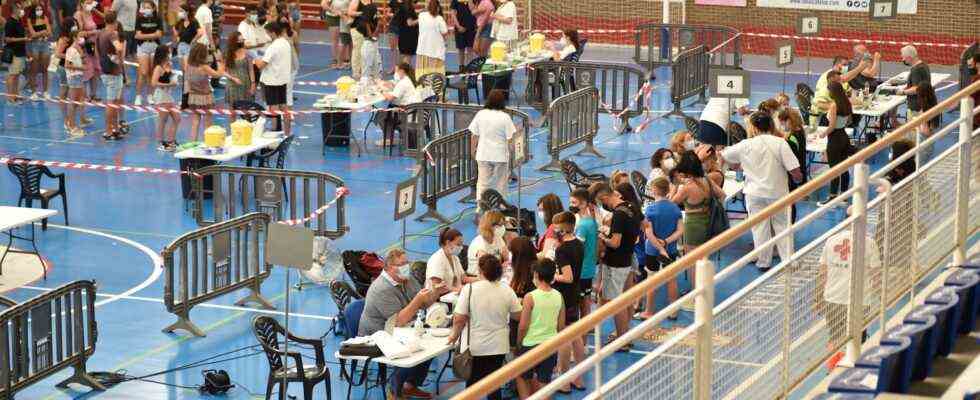Status: 04.09.2021 4.30 p.m.
While the vaccination rate is only increasing slowly in Germany, progress is much faster in Spain. A good 70 percent of people are fully vaccinated against Covid-19. This is also due to the vaccination culture in the country.
Amelie shows the patch on her upper arm when she comes from a vaccination center in Madrid. For the 15-year-old it is now “pauta completa”, she is now fully vaccinated. “I feel good. Soon I can relax again with my friends or go to a party.”
Amelie got vaccinated without an appointment. In Madrid alone, this is now possible in twelve vaccination centers, in two centers even 24 hours a day. Until recently it was still strictly regulated who was vaccinated and when in Spain: first the older ones, then the younger ones, there were only a few exceptions.
Strict procedure shows success
The appointments were assigned centrally – by phone call or SMS just a day or two in advance. Nobody had to take care of the corona vaccination independently. That was a good strategy of the government, says the Madrid sociologist Josep Lobera, who has just done a study on the progress of the vaccination campaign in Spain.
“People have simply witnessed the success of this comparatively strict procedure – in their age group: Friends or neighbors of the same age got an appointment at around the same time, had themselves vaccinated, and hardly anyone wanted to be left out,” explains Lobera. “Many also felt a social responsibility.”
Many young people in Spain feel it is their duty to protect their older family members.
Image: dpa
Many young people still live at home
In addition, the family is very important in Spain. You spend a lot of time together, younger people have seen their duty to be vaccinated in order to be less of a risk for older family members, says the sociology professor.
Young people in Spain were more likely to study in their hometown than in other European countries, he explains. “They still live with their parents for a long time. Even if they work later, they rarely move to other cities. That is why they see their parents and grandparents more often than young people in other countries where the family also plays an important role plays, but you don’t necessarily live near or even in the same house with her. “
Another factor is the vaccination culture in Spain. In the late 1970s, the country beat a polio epidemic thanks to vaccinations, says Lobera. It was the time when vaccine-skeptical movements arose in other European countries. They couldn’t gain a foothold in Spain. Instead, the state health system gained a high reputation among the population. Spanish pediatricians report that virtually no parents questioned vaccinations for young children.
Goal: Get closer to 100 percent
And so, according to official figures, only about six percent of Spaniards reject the current corona vaccination. “70 percent of people are now fully vaccinated,” said Spain’s Prime Minister Pedro Sánchez this week. “That makes us 100 percent proud and 100 percent convinced that we will win the fight against the virus.”
But Sánchez also emphasized that vaccination should continue. “After the 70 percent, the 80 and maybe the 90 percent should follow. The closer we get to the 100 percent, the more we protect our country, our friends and family and ensure that the economy goes up again.”
15-year-old Amelie also wants normality back, she says. That’s also why she got vaccinated. She wants to go out again and enjoy life – with less risk for herself and other people.
Corona vaccination master Spain: why is it going so well there?
Oliver Neuroth, ARD Madrid, September 4, 2021 4:01 p.m.

